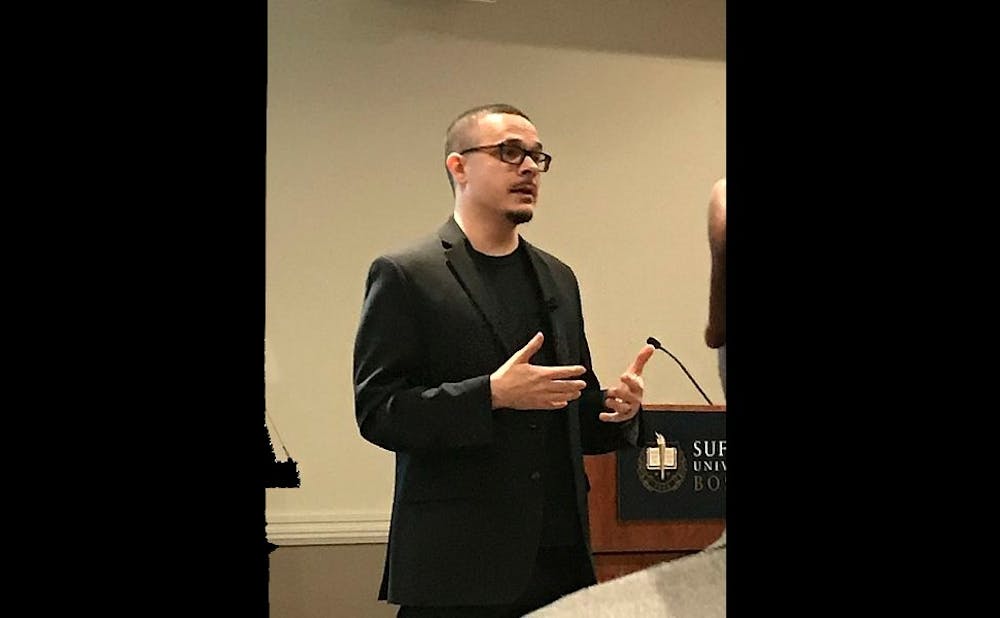Humans aren't always progressing, but rather move in a series of peaks and dips—and now, the world is in a dip, activist Shaun King argued at a talk Wednesday.
King—a Black Lives Matter activist and columnist for The Intercept—delivered his speech as a part of the annual Martin Luther King Jr. commemoration and celebration. He recounted the story of his transformation from a worker at an environmental charity to an activist, and argued that humanity must struggle to crawl its way out of the current dip.
“If [humanity] got better and better and better over time, that would mean we are peak humanity. That would mean Donald Trump is peak human,” King said. “I’m just saying, I don’t even think [First Lady] Melania [Trump] believes that.”
King cited German historian Leopold von Ranke's work as inspiration for his philosophy on humanity. The continued improvement and refinement of technology does not necessarily mean human beings are undergoing the same evolution, he explained.
The current issues America is wrestling with—alongside recent past atrocities such as the Rwandan genocide and the Holocaust—show that humanity does not always improve and suggest that the world has entered a dip, though no one knows where it will go from here, he argued.
“Truthfully, it’s hard to judge history while you’re in it,” he said. “It’s hard to understand it while you’re in it.”
King also touched on how his past activism informed the efforts he is involved with today.
His advocacy against police brutality started before 2014, tracing its way back to King’s time as an undergraduate at Morehouse College, where he served as student government president. In 1999, King recalled that police fired at 23-year-old Amadou Diallo—an immigrant from Guinea who was unarmed, 41 times near his apartment in New York City—leading King and a group to organize and protest the killing.
Fifteen years later, King received an email from a friend as he was sitting in the offices of Global Green, the environmental charity where he worked before becoming an activist. The email contained a link to the video of Eric Garner’s death at the hands of New York Police Department officers. The video would forever alter King’s life.
“I can’t explain what happened, but I was so shook by watching him be alive and then be dead—all in a span of about three minutes—with no gun, no knife,” he said.
Less than a month afterward, King would watch the footage of Michael Brown’s shooting in Ferguson, Mo., which would prompt a long period of unrest in the St. Louis suburb. The wailing and screaming from some of Brown’s family members in the video after his shooting deeply affected King, he said.
As he spoke to more and more families whose loved ones were shot by police, King would include a familiar refrain in his comforting words—that justice would be served. But after seeing many officers get off scot-free, King began to doubt his reassurance.
“I never could have imagined that each and every one of those families would be denied justice,” he said.
When 15-year-old Jordan Edwards was shot in 2017, King dropped the justice line from his advice and told Edwards’ family members what they were up against if they wanted justice for their son. A year later, the officer who shot Edwards was sentenced to 15 years in prison.
Despite the outcome, King explained that it didn’t feel much like a victory. The sentence was better than nothing, but it could not bring Edwards back to life, he said.
He also appealed directly to Duke students, asking them to continue striving to make the University a better place.
“It’s in your best interest that you be proud of this institution. Your degree is going to be from here,” King said. “For me, that also means holding Duke accountable, so I don’t ever want anybody to tell you that it’s problematic for you to try to help make Duke better.”
King also mentioned that he met with several administrators Wednesday to discuss ways in which Duke could improve.
Although the world finds itself consumed with troublesome actions, King emphasized the need to get out of the “dip in the quality of humanity.”
The effort needed to escape the dip is onerous and not as simple as President Donald Trump’s defeat in a potential 2020 reelection bid, he explained. Despite the challenge, however, King argued that humanity can overcome its current decline to rise back up.
“Yes, there are dips,” he said. “Human beings always fight themselves out of the dip.”
Get The Chronicle straight to your inbox
Signup for our weekly newsletter. Cancel at any time.

